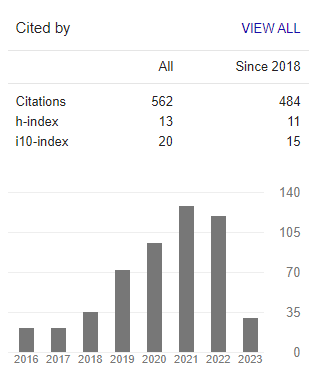HOW AN EX-CONVICT CHILD SURVIVES: Self-Conception, Symbolic Interaction, and Interpersonal Communication
Abstract
This article analyzes the process of forming RF’s self-concept before and after he was in Lembaga Pembinaan Khusus Anak (LPKA), the term for juvenile prison. The analysis uses the theory of symbolic interactionism by George Herbert Mead, dimensions of self-concept by Fitts, and interpersonal communication by Joseph A. DeVito, with a single case study method. The results showed that the self-concept of RF tends to be positive during and after leaving LPKA. The internal dimensions of RF’s self-concept are his emotionally intelligent identity and achievers; that behavior shows his positive self-disclosure and self-acceptance. Meanwhile, the external RF’s self-concept dimension is physical self-concept and confidence in his appearance. His self-concept speaks of happiness in public. RF’s social self-concept is happy to socialize with everyone, RF’s moral self-concept is that RF feels patient, and RF’s family self-concept is to help his family economy with halal work. In interpersonal communication, RF is now good at communicating his uniqueness, making reputation enhancements with a positive self-concept, and has made his work environment a lively community.
To cite this article (7th APA style):
Saputra, E. & Putri, D. M. (2021). How an ex-convict child survives: Self-conception, symbolic interaction, and interpersonal communication. Journal Communication Spectrum: Capturing New Perspectives in Communication, 11(2), 95-107. http://dx.doi.org/10.36782/jcs.v11i2.2025
Keywords
References
Arista, Dwi. (2017). Kebermaknaan Hidup Dan Religiusitas Pada Mantan Narapidana Kasus Pembunuhan (Di Kabupaten Paser). PSIKOBORNEO. 5 (3) : 602-619
Arnett, Jeffrey Jensen. (2004). Emerging Adulthood: The Winding Road From the Late Teens Through the Twenties. New York: Oxford University Press, Inc.
Arruda, William. (2007). Career Distinction: Stand Out by Building Your Brand. New Jersey: John Wiley & Sons, Inc.
Blanco, Roberto Alvarez del. 2010. Personal Brands : Manage Your Life with Talent and Turn it into a Unique Experience. Palgrave Macmillan
Burns, R.B. 1993. Konsep Diri (Teori, Pengukuran, Perkembangan dan Perilaku). Jakarta: Arcan.
Celik, Nur Demirbas & Huseyin Mertol. 2018. Gifted Students’ Purpose in Life. Universal Journal of Educational Research. 6 (10): 2210-2216.
Calhoun, J.F., & Acocella, J.R. 1995. Psikologi tentang penyesuaian dan hubungan kemanusiaan. Alih Bahasa: R.S. Satmoko IKIP Semarang Press Semarang.
Devito, Joseph A, Rena Shimoni & Dawne Clark. 2015. Messages: Building Interpersonal Communication Skills. Pearson Canada.
Fitts, W.H., et.al. 1971. The Self Concept and Self Actualization. Tennesee: Social and Rehabilitation Service.
Giyanto, Cipta. 2016. berjudul Lembaga Pemasyarakatan kelas II A Pondok Bambu, Jakarta Timur. Fakultas Psikologi. Universitas Islam Negeri Maulana Malik Ibrahim Malang.
Griffin, Emory. 2012. A First Look at Communication Theory 8th Edition. McGraw-Hill Education.
Iskandar, Ibraham Barkah. 2017. Resiliensi Mantan Narapidana Terhadap Penolakan Lingkungan. Fakultas Psikologi. Universitas Sanata Dharma Yogyakarta.
Mead, George. H. 1934. Mind, Self, and Society From The Standpoint of A Social Behaviorist. The University of Chicago Press.
Merdeka (2016, 19 April). Menteri Saleh: Pekerja Mantan Napi Masih Dipandang Rendah Perusahaan. Merdeka.com. https:merdeka.com/2016-uang-menteri-saleh-pekerja-mantan-napi-masih-dipandang-rendah-perusahaan.
Merriam, Sharan B. & Elizabeth J. Tisdell. 2018. QUALITATIVE RESEARCH A Guide to Design and Implementation Fourth Edition. Jossey-Bass A Wiley Brand.
Montoya, Peter. 2008. The Brand Called You: Make Your Bussiness Stand Out in a Crowded Market Place. USA: McGraw-Hill.
Morissan. 2013. Teori komunikasi : individu hingga massa . Jakarta : Kencana
Neuman, W. Lawrence. 2014. Social Research Methods: Qualitative and Quantitative Approaches W. Lawrence Neuman Seventh Edition. Edinburgh: Pearson Education Limited
News.detik (2018, 15 Februari). Tobat Setelah Delapan Kali Penjara.
News.detik.com. https:news.detik.com/2018- Tobat-Setelah-Delapan-Kali-Penjara.
Novianti, Riska Dwi, Mariam Sondakh & Meiske Rembang. (2017). Komunikasi Antarpribadi di Dalam Menciptakan Harmonisasi (Suami dan Istri) Keluarga Di Desa Sagea Kabupaten Halmahera Tengah. e-journal “Acta Diurna” Volume VI. No. 2. Tahun 2017 .
Poskota (2019, 9 September). Warga Pembinaan Lapas Pondok Bambu Ikut Pelatihan Pemasaran Digital. Poskota.com. https:poskota.id/2019-warga-binaan-lapas-pondok-bambu-ikut-pelatihan-pemasaran-digital.
Potgieter, Adele, Marianne Doubell & HB Klopper. (2017). Personal Branding Empirical Testing of Criteria For An Authentic Personal Brand
Rahmat, Jalaludin (2011). Psikologi Komunikasi, Bandung : PT. Remaja Rosdakarya.
Rampershad, Hubert K. 2009. Authentic Personal Branding. North Carolina: Age Publishing.
Rangkuti, Freddy. 2010. Strategi Promosi Yang Kreatif dan Analisis Kasus Integrated Marketing Communication, Gramedia Pustaka Utama, Jakarta.
Scheid, Terera L & Tony N. Brown. 2010. A Handbook for the Study of Mental Health: Social Contexts, Theories and Systems. Cambridge University Press
Scott, Matthew J & Adam B. Cohen. 2019. Surviving and Thriving: Fundamental Motives Provide Purpose in Life.
Sugiyono. 2015. Metode Penelitian Manajemen (Mix Methods). Bandung.
West, Richard dan H. Turner, Lynn. 2010. Pengantar Teori Komunikasi Edisi 3. Salemba Humanika. Jakarta
Refbacks
- There are currently no refbacks.

This work is licensed under a Creative Commons Attribution 3.0 License.
Indexed by:
Archived in:
Listed in:
INTERNATIONAL ASSOCIATION FOR MEDIA AND COMMUNICATION RESEARCH

















